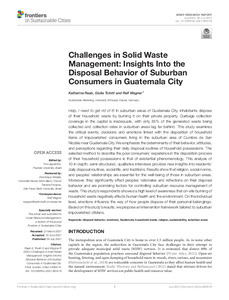| dc.date.accessioned | 2021-08-02T13:25:46Z | |
| dc.date.available | 2021-08-02T13:25:46Z | |
| dc.date.issued | 2021-07-09 | |
| dc.identifier | doi:10.17170/kobra-202107294427 | |
| dc.identifier.uri | http://hdl.handle.net/123456789/13065 | |
| dc.description.sponsorship | Gefördert durch den Publikationsfonds der Universität Kassel | ger |
| dc.language.iso | eng | eng |
| dc.rights | Namensnennung 4.0 International | * |
| dc.rights.uri | http://creativecommons.org/licenses/by/4.0/ | * |
| dc.subject | disposal behavior | eng |
| dc.subject | emotions | eng |
| dc.subject | Guatemala | eng |
| dc.subject | household waste | eng |
| dc.subject | religion | eng |
| dc.subject | sustainability | eng |
| dc.subject | suburban areas | eng |
| dc.subject.ddc | 300 | |
| dc.title | Challenges in Solid Waste Management: Insights Into the Disposal Behavior of Suburban Consumers in Guatemala City | eng |
| dc.type | Aufsatz | |
| dcterms.abstract | Help, I need to get rid of it! In suburban areas of Guatemala City, inhabitants dispose of their household waste by burning it on their private property. Garbage collection coverage in the capital is inadequate, with only 85% of the generated waste being collected and collection rates in suburban areas lag far behind. This study examines the critical events, decisions and emotions linked with the disposition of household items of impoverished consumers living in the suburban area of Cumbre de San Nicolás near Guatemala City. We emphasize the determinants of their behavior, attitudes, and perceptions regarding their daily disposal routines of household possessions. The selected method to describe the poor consumers' experience in the disposition process of their household possessions is that of existential phenomenology. This analysis of 10 in-depth, semi-structured, qualitative interviews provides new insights into residents' daily disposal routines, social life, and traditions. Results show that religion, social norms, and peoples' relationships are essential for the well-being of those in suburban areas. Moreover, they significantly affect peoples' rationales and reflections on their disposal behavior and are promising factors for controlling suburban resource management of waste. This study's respondents showed a high level of awareness that on-site burning of household waste negatively affects human health and the environment. On the individual level, emotions influence the way of how people dispose of their personal belongings. Based on this study's results, we propose an intervention framework tailored to suburban impoverished citizens. | eng |
| dcterms.accessRights | open access | |
| dcterms.creator | Raab, Katharina Silke | |
| dcterms.creator | Tolotti, Giulia | |
| dcterms.creator | Wagner, Ralf | |
| dc.relation.doi | doi:10.3389/frsc.2021.683576 | |
| dc.subject.swd | Guatemala (Stadt) | ger |
| dc.subject.swd | Entsorgung | ger |
| dc.subject.swd | Verhalten | ger |
| dc.subject.swd | Haushaltsabfall | ger |
| dc.subject.swd | Religion | ger |
| dc.subject.swd | Nachhaltigkeit | ger |
| dc.subject.swd | Vorstadt | ger |
| dc.type.version | publishedVersion | |
| dcterms.source.identifier | eissn:2624-9634 | |
| dcterms.source.journal | Frontiers in sustainable cities | eng |
| dcterms.source.volume | Volume 3 | |
| kup.iskup | false | |
| dcterms.source.articlenumber | 683576 | |


